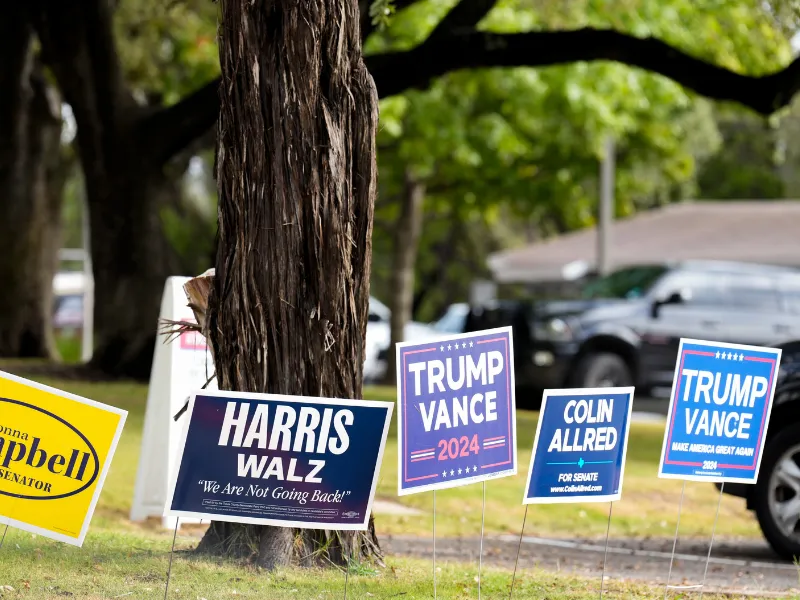By: Seana Davis
November 8 2024
 Photograph of election signs (Photo by Scott Coleman/LiveMedia/Sipa USA)
Photograph of election signs (Photo by Scott Coleman/LiveMedia/Sipa USA)
It was an election called within hours. What was predicted to be a tight race ended in a decisive victory for Republican Donald Trump. The New Yorker was swiftly named the next President of the United States, with crucial swing states flipping red, much to the despair of Democrat Kamala Harris' supporters.
The lead-up to election day was a divisive one, with two attempted assassinations, one inherited Democrat campaign and one man returning to the White House.
The division hasn't dissipated. Before and after the result was called, claims of election denial gripped certain corners of the internet, resounding in fiercely partisan bubbles.
From the right, Trump himself took to Truth Social in the early hours of the count to produce an unfounded claim of "cheating" targeting Philadelphia, a city in Pennsylvania—a state that was marred by claims of voter fraud in the lead-up to the election.
He followed his Truth Social post with another, "Philadelphia and Detroit! Heavy Law Enforcement is there!!!"
The City Commissioner of Philadelphia, Seth Bluestein, quickly refuted his assertion, calling it "another example of disinformation." Philadelphia's District Attorney, Larry Krasner, followed suit, saying that there was "no factual basis" from within law enforcement to support Trump's claim.
That would be Trump's last Truth Social post hinting at nefarious actions at polling stations for the evening as he took the lead in Pennsylvania and, with it, won the election.
Following the election, the U.S. Cybersecurity and Infrastructure Security Agency (CISA) said that "election infrastructure has never been more secure."
But claims of voter fraud and election denial have continued late into the week. Although Harris conceded the election on November 6, urging her voters to "accept the results of this election," certain factions of the online sphere have not.
Dr Daniel Jolley, an assistant professor in social psychology at the University of Nottingham, told Logically Facts, "Conspiracy theories are often used as a vehicle to explain the causes of significant events, including the loss of an election."
Post-election, claims quickly gained traction, questioning how there was a perceived drop in millions of Democrat and Republican voters compared to 2020.
"Something doesn't add up," one account that shared the claim said, and the post garnered more than 14 million views.
Another said in a post published on November 6, "I hope in the coming days someone is able to explain how we had record turnout but 18M fewer votes than 2020. Both of those things can’t be true."
That post got nearly 10 million views on X. The claim fails to consider that all the votes hadn't been counted at the time—Harris had over 69 million votes to Trump's 73 million as of November 8, per Reuters' ongoing tally, and counting has yet to be fully wrapped up.
This compares to Biden's 81 million and Trump's 74 million total votes in 2020.
For others, Trump's victory and the voter turnout offered a chance to revive a years-old, well-trodden falsity—that the 2020 election was stolen from him.
One video posted to TikTok, detected by Logically Accelerate, a tool that discovers fact-check-worthy content on social media, questioned the voter turnout, adding, "Something's fishy. You guys want to keep talking about January 6th, but I think we’re going to find out that somebody cheated."
Some conspiracy theory accounts denied Trump’s legitimacy altogether, with one grainy photograph of Trump donning a red cloak gathering more than 400,000 views on X, posted with a caption saying, "Trump is selected not elected."
The photograph showed Trump receiving an honorary doctorate degree in 2010, not attending a secret anointment to the presidency.
For voters who view the result unfavourably, conspiracy theories offer faux reasoning.
"For those on the losing side, framing the election as 'rigged' or 'stolen' offers a psychologically comforting explanation that can shift blame outward and maintain a sense of control," Jolley said.
"This response, rooted in a need for understanding and a tendency to view adverse outcomes through a lens of suspicion, underscores how conspiracy theories can be used to rationalise unfavourable results and protect self-esteem," he added.
Follow Logically Facts' coverage and fact-checking of the U.S. Election 2024 here.